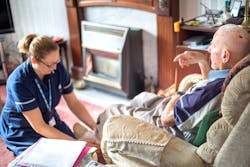Many health systems are eagerly waiting to see whether the U.S. Congress will act to extend the Acute Hospital Care at Home waiver put in place by the Centers for Medicare & Medicaid Services (CMS) during the pandemic to increase the capacity of healthcare systems to provide care outside a traditional hospital setting, including in the home.
More than 200 hospitals in 34 states are currently participating in the Acute Hospital Care at Home program.
Moving Health Home, a coalition of healthcare organizations advocating for improved access to home-based care, recently sent a letter to congressional leaders requesting an extension of two years. The letter collected signatures from 48 stakeholder organizations, including health systems, home health agencies, value-based care companies, nonprofit entities, home infusion groups, and more.
The waiver is set to expire at the end of the public health emergency unless Congress acts. Temporarily extending the program would allow for additional data collection and inform lessons learned, as well as provide the necessary time for a legislative process to establish a permanent Acute Care at Home program for Medicare patients, according to the group.
“Providers and patients are utilizing the waiver flexibilities to bring care into patients’ homes – helping to improve patient and caregiver experiences, increasing facility capacity, and keeping at-risk populations safer in their homes,” said Alison Armstrong, executive director of Moving Health Home, in a statement.
The uncertainty about when the waiver will end creates barriers to entry for new participants, the organization said. Health systems and providers have concerns with making significant investments in home-based care models if the program may abruptly end.
By extending the waiver for an additional two years, innovative home-based care delivery models will be able to continue expanding and enhancing their programs and meeting patients’ needs in ways that will never be possible in an institutional setting, the group said.
The letter also suggests that Congress should work to authorize a permanent Acute Care in the Home model that builds on lessons learned during the pandemic and includes additional innovative design elements such as:
• Expand opportunities for providers to refer patients to inpatient care in the home, allowing community referrals from urgent care centers, physician practices, or other eligible acute care visits such as home visits.
• Expand the types of clinical providers that would be considered eligible to provide inpatient hospital services, and inpatient hospital comparable services during the episode of inpatient care at home.
• Shift away from fee-for-service by incorporating a prospective payment system that drives better quality, reduces costs, and enables providers to make the upfront investment needed to participate in the model.
In December, Moving Health Home released a consumer survey sponsored by BrightStar Care, Home Instead, Intermountain Healthcare, and Vituity. Highlights include:
• 70 percent of those surveyed are comfortable with care in the home citing that familiarity helps alleviate anxiety and improve communication. This is especially important for those from underserved and minority communities.
• 73 percent of adults are confident in the quality of receiving care in the home.
• 85 percent of caregivers are confident in the quality of receiving care in the home.
• 88 percent of adults were satisfied with the clinical care services they received in the home.
• 85 percent of people who have had experience with care in the home would recommend it to family and friends.
• A bipartisan majority of consumers say it should be a priority for the federal government to increase access to clinical care in the home (73 percent Democrats, 61 percent Republicans).


